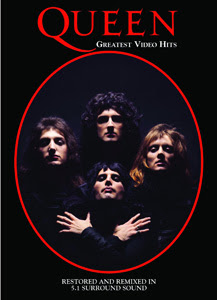DVD Review: Freddie Mercury - Freddy Mercury: The Great Pretender
Eagle Vision
All Access Review: A-
 |
| Freddie Mercury - The Great Pretender 2012 |
At death’s door, Freddie Mercury decided to reveal in a
press release that he, indeed, had full-blown AIDs and that he wasn’t long for
this world. The news wasn’t surprising. In public appearances around that time,
Mercury appeared gaunt, as if he was simply wasting away to nothing. The rumor
mill had been spinning out of control for a while, with many speculating that
Mercury was in the throes of the deadly disease, and when the end came, the vultures
descended to viciously pick his bones clean. Mercilessly, the British tabloids
savaged Mercury and his personal life, taking him to task for his reckless
promiscuity and his libertine lifestyle. Judgment day had arrived for this
modern-day Oscar Wilde, only it was the armchair moralists and the
gossipmongers rendering their verdicts, not Mercury’s maker.
Coming to his defense, Queen’s Brian May and Roger Taylor
went on TV to attempt to restore his good name and talk about the Freddie Mercury
they knew, the quiet, more reserved aesthete who was completely at odds with
the over-sexed madman in press portrayals. And there was more – much more, as
it turned out – to Mercury than meets the eye, as the new documentary film
“Freddie Mercury: The Great Pretender” makes so abundantly clear. Mostly
concerned with the extreme highs and lows – both professional and personal –
that Mercury experienced between the recording of his first solo album, the
disastrous Mr. Bad Guy, and his
tragic ending, “Freddie Mercury: The Great Pretender,” out via Eagle Entertainment, weaves together electrifying
live footage – the Live Aid stuff, with Mercury exhorting the massive crowd to sing with him, is captivating – with candid, behind-the-scenes images of the
singer and impactful interview snippets from the likes of May and Taylor, as
well as friends and associates such as television personality Paul Gambaccini
and Queen manager Jim Beach, to manufacture a colorful narrative fabric that
Mercury would wear like a royal cape.
Edited and produced by Rhys Thomas, a diehard Queen fanatic,
the documentary artfully explores how Mercury immersed himself in New York City’s
wild gay club life and became fascinated with disco and Donna Summer, this along
with his deep and abiding love and appreciation of opera and the ballet, which
resulted in his sublime 1979 performance of “Bohemian Rhapsody” with the Royal
Ballet. Going further, through Mercury’s own truthful admission, Thomas reveals
the extent to which Mercury felt disengaged and distanced from his Queen band
mates, due to their different outside interests, and the bullheadedness Mercury
exhibited in steering Hot Space into
more dance-oriented territory, which heated the friction between Mercury and
May to an almost unbearable temperature.
And while all this controversy and drama certainly makes for
good viewing, Thomas is also careful to attend to the smaller, more mundane aspects of Mercury's life, laying bare the vulnerabilities that made him uncertain in interpersonal relationships. Loyal to a fault, as his divisive relationship with former
manager Paul Prenter illustrates – in the film, Taylor dismissively says of
Prenter, “The less said about him the better” – Mercury was a cat lover, who
could be shy and retiring offstage and willingly lament the fact that he didn’t
have many close friends, as he did in a poignant talk about his star-crossed
relationship with girlfriend Mary Austin in the movie, Mercury wasn’t the arrogant
superman his dazzling onstage persona would suggest. He did have his endearing
qualities, though, as his giddy adoration of opera singer Montserrat Caballe –
whose friendship with Mercury is treated with such tenderness and pure joy in the
film – so aptly demonstrates. It was Mercury’s determination to work with her
that brought the two vocalists together for one of the most spectacular
collaborations in music history, as their clarion calls sent the massive
international hit single “Barcelona” soaring to the heavens. Outside of Queen,
it was Mercury’s greatest triumph; more than that, it washed away the bad taste
left in his mouth from Mr. Bad Guy,
the result of a bloated contract with Mercury as a solo artist that caused
excruciating financial pain to his record label.
Driving right through that intersection where art and life
collide, “Freddie Mercury: The Great Pretender” pulls no punches, and yet it is
a warm, wistful eulogy to an artist who never stopped creating, even as AIDS
ravaged his body. Startlingly honest and forthright about Mercury’s failings and
his grand ambitions, the film introduces the world to Mercury’s flawed
humanity, and through Thomas’s multi-faceted portrait, the once-blurry and
undefined picture of Mercury, the man, comes sharply into focus. Near the end,
as is outlined in Thomas’s heartfelt liner notes to the DVD, Beach once asked
Mercury what he wanted done with his legacy and all that he’d left behind.
Mercury responded, in typical devil-may-care fashion, by saying, “You can do
whatever you like with my image, my music, remix it, re-release it, whatever –
just never make me boring.” Mission accomplished.
-
Peter Lindblad


